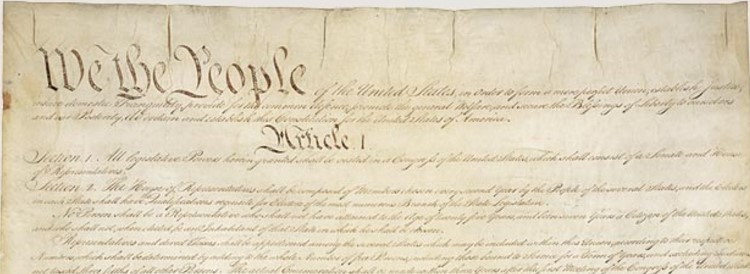This section of Article 1 outlines Congressional Powers:
The Congress shall have Power To lay and collect Taxes, Duties, Imposts and Excises, to pay the Debts and provide for the common Defense and general Welfare of the United States; but all Duties, Imposts and Excises shall be uniform throughout the United States;
Basically, Federal taxes have to be uniform throughout the states. You can’t give a cheaper import duty to Virginia and a higher one to California.
To borrow Money on the credit of the United States;
Yes, the US is allowed to borrow money, but only Congress has the power to do it or not.
To regulate Commerce with foreign Nations, and among the several states, and with the Indian Tribes;
International commerce regulations lie with Congress.
To establish an uniform Rule of Naturalization, and uniform Laws on the subject of Bankruptcies throughout the United States;
We decided we did want to allow people born elsewhere to become citizens. It is Congress’ responsibility to set up those rules. Also laws on bankruptcy must be uniform across the states.
To coin Money, regulate the Value thereof, and of foreign Coin, and fix the Standard of Weights and Measures;
It is Congress’ responsibility to regulate the value of the coinage (and paper money). We use pounds, miles, inches, feet and yards because Congress says that’s the standard.
To provide for the Punishment of counterfeiting the Securities and current Coin of the United States;
Counterfeiting is a Federal offense and punishments for such are regulated by Congress.
To establish Post Offices and post Roads;
The USPS was established right here in this sentence. Post Roads were merely roads maintained to help the mail go through easier. I haven’t looked it up, but one wonders about state roads used for the Postal Service and Federal responsibility.
To promote the Progress of Science and useful Arts, by securing for limited Times to Authors and Inventors the exclusive Right to their respective Writings and Discoveries;
Patents and copyright laws are a Congressional responsibility in the US.
To constitute Tribunals inferior to the supreme Court;
The Federal court system is also under Congressional power.
To define and punish Piracies and Felonies committed on the high Seas, and Offences against the Law of Nations;
This is an interesting one. Privateering was an issue between nations was still quite an issue even if the Golden Age of Piracy was still past. It is a Congressional responsibility to define this.
To declare War, grant Letters of Marque and Reprisal, and make Rules concerning Captures on Land and Water;
Only Congress has the power to declare war and to regulate the dispersal of the spoils of war.
To raise and support Armies, but no Appropriation of Money to that Use shall be for a longer Term than two Years;
See this? TECHNICALLY, we’re not supposed to have a standing army. Given the amount of training a private requires to be useful now in our highly-technical world, I am not entirely sure that’s practical. But since things have changed, perhaps an Amendment would be in order?
To provide and maintain a Navy;
But a standing navy is just fine, apparently…
To make Rules for the Government and Regulation of the land and naval Forces;
Congress oversees the military.
To provide for calling forth the Militia to execute the Laws of the Union, suppress Insurrections and repel Invasions;
Because we did not have a standing army, the idea was that civil disorder and invasion forces would be dealt with by local militias. Again, soldiering is a highly skilled profession these days. Not sure how that would work out.
To provide for organizing, arming, and disciplining, the Militia, and for governing such Part of them as may be employed in the Service of the United States, reserving to the States respectively, the Appointment of the Officers, and the Authority of training the Militia according to the discipline prescribed by Congress;
Again, responsibility for the military forces is a Congressional responsibility. (By the way, this was for a very specific reason. We do not want the US military forces in the hands of one person.)
To exercise exclusive Legislation in all Cases whatsoever, over such District (not exceeding ten Miles square) as may, by Cession of particular States, and the Acceptance of Congress, become the Seat of the Government of the United States, and to exercise like Authority over all Places purchased by the Consent of the Legislature of the State in which the Same shall be, for the Erection of Forts, Magazines, Arsenals, dock-Yards, and other needful Buildings; —And
To make all Laws which shall be necessary and proper for carrying into Execution the foregoing Powers, and all other Powers vested by this Constitution in the Government of the United States, or in any Department or Officer thereof.
This allows for the establishment of a government center that does not belong to any state. The last clause is also known as the “Elastic clause” because it basically says, “Yo, if we need to make a law to run the country well, we can!” (You think the Bill of Rights was an accident, do you?)

